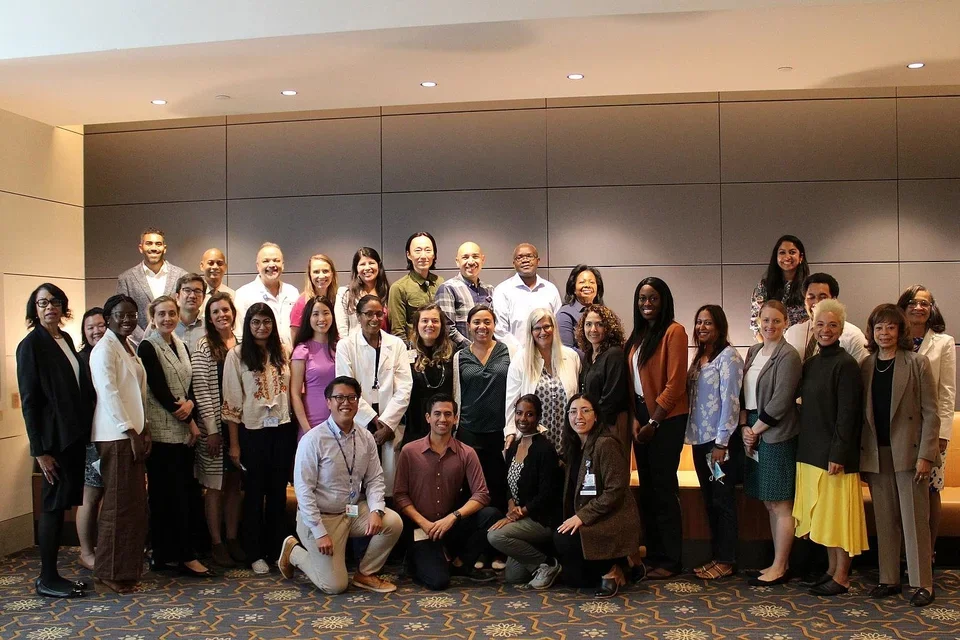Junior Faculty Academic Mentorship
Expanding the professional development and retention of faculty reflective of Los Angeles.

Apply to JAM
The 2025-2026 JAM Council program offers a fellowship that includes a one-year period, starting September 2025, of mentoring training with extensive coaching, networking and mentoring opportunities aimed at expanding the professional development and retention of junior faculty in academic medicine. The intensive one-year period will be followed by ongoing support and coaching as needed to support scholars in their academic trajectory. Preview Mentee Application or Preview Mentor Application. All are welcome to apply. Accepting applications now, closing on April 18, 2025
Deadline: April 18, 2025 8:00 AM PST
Note: Acceptance into the JAM Council Program is determined through a competitive selection process in which approximately 25 candidates are chosen annually.
Applicant Requirements
Requirements for Mentee Applicants
- Applicants must have held the rank of assistant professor at DGSOM.
- Applicants may self-nominate and must be supported by the departmental leadership (including department chair, department OIE vice chair or lead, or division chief. Note the OIE Office will solicite these letters)
- Applicants will participate in monthly meetings with their assigned mentor, monthly meetings with their mentoring cohort, and quarterly meetings with JAM Council. Applicants will be supported in a scholarly project that helps them develop and advance their career goals. Expected time commitment: approximately 4 hours per month.
Requirements for Mentor Applicants
- Applicants must hold the rank of associate or full professor with faculty appointment at DGSOM.
- Applicants may self-nominate and must be supported by the departmental leadership (including department chair, department OIE vice chair or lead, or division chief).
- Applicants must commit to support the scholarly projects of the prospective mentees and facilitate the development and advancement their career goals.
- Applicants must have TWO (2) recommendations that address the capability for mentoring and sponsoring career development of junior faculty. One must come from the department chair and the other from a current or former mentee familiar with the mentor’s mentoring track record and/or potential. (note the OIE office will solicit these letters)
- Applicants should include a list of current or former mentees and current positions.
- Applicants will participate in monthly meetings with their assigned mentee, monthly meetings with their mentoring cohort, and quarterly meetings with JAM Council. Expected time commitment: approximately 10 hours per week.
2025-2026 Program Schedule
Successful applicants will participate in a focused mentor/mentee training institute (2 day, 16-hour curriculum), along with an ongoing mentoring program composed of a combination of individual, small team, and group mentoring during the year. The training curriculum is a collaboration of two existing successful and evidence- based programs, Entering Mentoring and Enhancing Mentoring. The combined curriculum will include didactics, multimedia presentations, breakout sessions, group work and role playing.
2025-2026 Monthly Meeting are held on the once a month 5pm-6pm followed by assigned mentoring groups from 6pm-7pm.
Added in the winter of 2023 Individual Academic Career Support Meetings with Academic Affairs, Senior Associate Dean for Faculty Development, Mentorship and Recognition, Dr. Robert A. Whittington.
Overview
The David Geffen School of Medicine at UCLA has initiated the Junior Faculty Academic Mentoring (JAM) Council. The JAM Council is designed to specifically meet the mentoring challenges of scholars with clinical and research backgrounds and careers. All are welcome to apply.
The JAM Council program has been specifically developed for faculty at the assistant professor level who demonstrate potential for careers in academic medicine and health leadership.
JAM Council
Established in 2022, the Inclusive Excellence Junior Faculty Academic Mentoring (JAM) Council is a program composed of a 16-hour curriculum combined with individual, small team, and group mentoring during the year. The training curriculum is a collaboration of two existing successful and evidence- based programs, Entering Mentoring and Enhancing Mentoring.
The combined curricula will include didactics, multimedia presentations, breakout sessions, group work and role playing. The program is designed to specifically meet the mentoring challenges of scholars with clinical and research backgrounds and careers. The curriculum includes didactics, multimedia presentations, breakout sessions, group work and role playing.
The JAM Council program offers an intensive one-year fellowship of mentoring training combined with extensive coaching, networking, and mentoring opportunities aimed at expanding the professional development and retention of faculty in academic medicine. The JAM Council program has been specially developed for faculty at the assistant professor level who demonstrate potential for careers in academic medicine and health leadership.
Acceptance into JAM is determined through an annual competitive selection process in which approximately 25 candidates are chosen each year.
Connect With Us
Questions regarding the JAM Program can be directed to:
Isadora Avendaño
310-825-2253
iavendano@mednet.ucla.edu